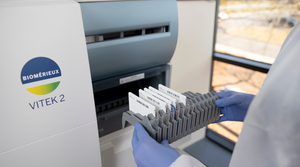Georgia Tech 'Sets the Standard' for Medical RFID Testing
October 9, 2009

gatech
Georgia Tech recently began testing whether RFID systems cause any negative effects on medical devices such as implants. Image courtesy of Georgia Tech, Gary Meek
Despite the surge in RFID use, the medical industry does not have any published standardized, repeatable methodology for testing and evaluating the potential effects of electromagnetic interference (EMI) on equipment and devices, such as implants. The Georgia Tech Research Institute (GTRI, Atlanta) is looking to change that.Supervised by the international trade association AIM Global and medical device testing company MET Laboratories, the group has embarked on a project to develop testing protocols for RFID technology in healthcare settings. The need for a standard, according to the researchers, stems from the fact that the internal makeup of each medical device is unique to some extent, and thus can react in different ways to the same electromagnetic environment. Because reports of the effects of RFID environments on medical products have not demonstrated a consensus, it is imperative to establish a standard for testing, asserts Ralph Herkert, director of GTRI's medical device test center. To that end, the researchers will work to determine the optimal method for measuring whether EMI can be attributed to RFID emission in a variety of settings.Testing is performed by simulating real-world conditions in which a device would be exposed to emissions. By doing so, the researchers can then assess whether or not a medical device is negatively affected by an RF-emitting product. The group is also examining if certain devices are more vulnerable than others to RF emissions, and what steps could be taken to reduce effects. Effects of RFID on device functionality will be tested for a variety of devices, including pacemakers, implantable cardio defibrillators, neurostimulators, implantable infusion pumps, and cardiac monitors."A comprehensive set of test protocols, which are sufficiently precise to permit repeatable results, is required to understand if there is an interaction between various types of RFID systems and active implantable medical devices, electronic medical equipment, in vitro diagnostic equipment, and biologics. Only after the protocols are developed will we be able to investigate the cause of any interactions, the result of any interactions, and ways manufacturers might eliminate or mitigate interactions," says Craig K. Harmon, president and CEO of Q.E.D. Systems and chairman of AIM Global's RFID Experts Group.
You May Also Like


